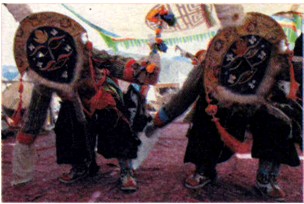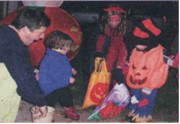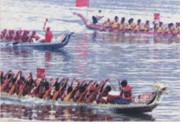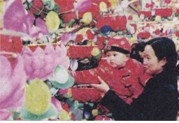普通高中课程标准实验教科书 英语必修3 Unit 1 Festivals around
时间:2018-12-04 作者:英语课 分类:高中一年级英语
英语课
Festivals and celebrations of all kinds have been held everywhere since ancient times. Most ancient festivals would celebrate the end of cold weather, planting in spring and harvest in autumn. Sometimes celebrations would be held after hunters had caught animals. At that time people would starve if food was difficult to find, especially during the cold winter months. Today's festivals have many origins, some religious, some seasonal 1, and some for special people or events.
Festivals of the Dead
Some festivals are held to honour the dead or to satisfy the ancestors, who might return either to help or to do harm. For the Japanese festival Obon, people should go to clean graves 2 and light incense 3 in memory of their ancestors. They also light lamps and play music because they think that this will lead the ancestors back to earth. In Mexico, people celebrate the Day of the Dead in early November. On this important feast 4 day, people eat food in the shape of skulls 5 and cakes with "bones" on them. They offer food, flowers and gifts to the dead. The Western holiday Halloween also had its origin in old beliefs about the return of the spirits of dead people. It is now a children's festival, when they can dress up and go to their neighbours' homes to ask for sweets. If the neighbours do not give any sweets, the children might play a trick on them.
Festivals to Honour People
Festivals can also be held to honour famous people. The Dragon Boat Festival in China honours the famous ancient poet, Qu Yuan.In the USA, Columbus Day is in memory of the arrival of Christopher Columbus in the New World. India has a national festival on October 2 to honour Mohandas Gandhi, the leader who helped gain India's independence from Britain.
Harvest Festivals
Harvest and Thanksgiving festivals can be very happy events. People are grateful because their food is gathered for the winter and the agricultural work is over. In European ountries, people will usually decorate churches and town halls with flowers and fruit, and will get together to have meals. Some people might win awards for their farm produce, like the biggest watermelon or the most handsome rooster. China and Japan have mid-autumn festivals, when people admire the moon and in China, enjoy mooncakes.
Spring Festivals
The most energetic and important festivals are the ones that look forward to the end of winter and to the coming of spring. At the Spring Festival in China, people eat dumplings, fish and meat and may give children lucky money in red paper. There are dragon dances and carnivals 6, and families celebrate the Lunar New Year together. Some Western countries have very exciting carnivals, which take place forty days before Easter, usually in February. These carnivals might include parades, dancing in the streets day and night, loud music and colourful clothing of all kinds. Easter is an important religious and social festival for Christians 7 around the world. It celebrates the return of Jesus from the dead and the coming of spring and new life. Japan's Cherry Blossom 8 Festival happens a little later. The country, covered with cherry tree flowers, looks as though it is covered with pink snow.
People love to get together to eat, drink and have fun with each other. Festivals let us enjoy life, be proud of our customs and forget our work for a little while.
Festivals and celebrations of all kinds have been held everywhere since ancient times. Most ancient festivals would celebrate the end of cold weather, planting in spring and harvest in autumn. Sometimes celebrations would be held after hunters had caught animals. At that time people would starve if food was difficult to find, especially during the cold winter months. Today's festivals have many origins, some religious, some seasonal, and some for special people or events.
Festivals of the Dead
Some festivals are held to honour the dead or to satisfy the ancestors, who might return either to help or to do harm. For the Japanese festival Obon, people should go to clean graves and light incense in memory of their ancestors. They also light lamps and play music because they think that this will lead the ancestors back to earth. In Mexico, people celebrate the Day of the Dead in early November. On this important feast day, people eat food in the shape of skulls and cakes with "bones" on them. They offer food, flowers and gifts to the dead. The Western holiday Halloween also had its origin in old beliefs about the return of the spirits of dead people. It is now a children's festival, when they can dress up and go to their neighbours' homes to ask for sweets. If the neighbours do not give any sweets, the children might play a trick on them.
Festivals to Honour People
Festivals can also be held to honour famous people. The Dragon Boat Festival in China honours the famous ancient poet, Qu Yuan.In the USA, Columbus Day is in memory of the arrival of Christopher Columbus in the New World. India has a national festival on October 2 to honour Mohandas Gandhi, the leader who helped gain India's independence from Britain.
Harvest Festivals
Harvest and Thanksgiving festivals can be very happy events. People are grateful because their food is gathered for the winter and the agricultural work is over. In European ountries, people will usually decorate churches and town halls with flowers and fruit, and will get together to have meals. Some people might win awards for their farm produce, like the biggest watermelon or the most handsome rooster. China and Japan have mid-autumn festivals, when people admire the moon and in China, enjoy mooncakes.
Spring Festivals
The most energetic and important festivals are the ones that look forward to the end of winter and to the coming of spring. At the Spring Festival in China, people eat dumplings, fish and meat and may give children lucky money in red paper. There are dragon dances and carnivals, and families celebrate the Lunar New Year together. Some Western countries have very exciting carnivals, which take place forty days before Easter, usually in February. These carnivals might include parades, dancing in the streets day and night, loud music and colourful clothing of all kinds. Easter is an important religious and social festival for Christians around the world. It celebrates the return of Jesus from the dead and the coming of spring and new life. Japan's Cherry Blossom Festival happens a little later. The country, covered with cherry tree flowers, looks as though it is covered with pink snow.
People love to get together to eat, drink and have fun with each other. Festivals let us enjoy life, be proud of our customs and forget our work for a little while.


Wangguo Festival


Festivals of the Dead
Some festivals are held to honour the dead or to satisfy the ancestors, who might return either to help or to do harm. For the Japanese festival Obon, people should go to clean graves 2 and light incense 3 in memory of their ancestors. They also light lamps and play music because they think that this will lead the ancestors back to earth. In Mexico, people celebrate the Day of the Dead in early November. On this important feast 4 day, people eat food in the shape of skulls 5 and cakes with "bones" on them. They offer food, flowers and gifts to the dead. The Western holiday Halloween also had its origin in old beliefs about the return of the spirits of dead people. It is now a children's festival, when they can dress up and go to their neighbours' homes to ask for sweets. If the neighbours do not give any sweets, the children might play a trick on them.
Festivals to Honour People
Festivals can also be held to honour famous people. The Dragon Boat Festival in China honours the famous ancient poet, Qu Yuan.In the USA, Columbus Day is in memory of the arrival of Christopher Columbus in the New World. India has a national festival on October 2 to honour Mohandas Gandhi, the leader who helped gain India's independence from Britain.
Harvest Festivals
Harvest and Thanksgiving festivals can be very happy events. People are grateful because their food is gathered for the winter and the agricultural work is over. In European ountries, people will usually decorate churches and town halls with flowers and fruit, and will get together to have meals. Some people might win awards for their farm produce, like the biggest watermelon or the most handsome rooster. China and Japan have mid-autumn festivals, when people admire the moon and in China, enjoy mooncakes.
Spring Festivals
The most energetic and important festivals are the ones that look forward to the end of winter and to the coming of spring. At the Spring Festival in China, people eat dumplings, fish and meat and may give children lucky money in red paper. There are dragon dances and carnivals 6, and families celebrate the Lunar New Year together. Some Western countries have very exciting carnivals, which take place forty days before Easter, usually in February. These carnivals might include parades, dancing in the streets day and night, loud music and colourful clothing of all kinds. Easter is an important religious and social festival for Christians 7 around the world. It celebrates the return of Jesus from the dead and the coming of spring and new life. Japan's Cherry Blossom 8 Festival happens a little later. The country, covered with cherry tree flowers, looks as though it is covered with pink snow.
People love to get together to eat, drink and have fun with each other. Festivals let us enjoy life, be proud of our customs and forget our work for a little while.
Festivals and celebrations of all kinds have been held everywhere since ancient times. Most ancient festivals would celebrate the end of cold weather, planting in spring and harvest in autumn. Sometimes celebrations would be held after hunters had caught animals. At that time people would starve if food was difficult to find, especially during the cold winter months. Today's festivals have many origins, some religious, some seasonal, and some for special people or events.
Festivals of the Dead
Some festivals are held to honour the dead or to satisfy the ancestors, who might return either to help or to do harm. For the Japanese festival Obon, people should go to clean graves and light incense in memory of their ancestors. They also light lamps and play music because they think that this will lead the ancestors back to earth. In Mexico, people celebrate the Day of the Dead in early November. On this important feast day, people eat food in the shape of skulls and cakes with "bones" on them. They offer food, flowers and gifts to the dead. The Western holiday Halloween also had its origin in old beliefs about the return of the spirits of dead people. It is now a children's festival, when they can dress up and go to their neighbours' homes to ask for sweets. If the neighbours do not give any sweets, the children might play a trick on them.
Festivals to Honour People
Festivals can also be held to honour famous people. The Dragon Boat Festival in China honours the famous ancient poet, Qu Yuan.In the USA, Columbus Day is in memory of the arrival of Christopher Columbus in the New World. India has a national festival on October 2 to honour Mohandas Gandhi, the leader who helped gain India's independence from Britain.
Harvest Festivals
Harvest and Thanksgiving festivals can be very happy events. People are grateful because their food is gathered for the winter and the agricultural work is over. In European ountries, people will usually decorate churches and town halls with flowers and fruit, and will get together to have meals. Some people might win awards for their farm produce, like the biggest watermelon or the most handsome rooster. China and Japan have mid-autumn festivals, when people admire the moon and in China, enjoy mooncakes.
Spring Festivals
The most energetic and important festivals are the ones that look forward to the end of winter and to the coming of spring. At the Spring Festival in China, people eat dumplings, fish and meat and may give children lucky money in red paper. There are dragon dances and carnivals, and families celebrate the Lunar New Year together. Some Western countries have very exciting carnivals, which take place forty days before Easter, usually in February. These carnivals might include parades, dancing in the streets day and night, loud music and colourful clothing of all kinds. Easter is an important religious and social festival for Christians around the world. It celebrates the return of Jesus from the dead and the coming of spring and new life. Japan's Cherry Blossom Festival happens a little later. The country, covered with cherry tree flowers, looks as though it is covered with pink snow.
People love to get together to eat, drink and have fun with each other. Festivals let us enjoy life, be proud of our customs and forget our work for a little while.


Wangguo Festival


1
adj.季节的,季节性的
- The town relies on the seasonal tourist industry for jobs.这个城镇依靠季节性旅游业提供就业机会。
- The hors d'oeuvre is seasonal vegetables.餐前小吃是应时蔬菜。
2 graves
n.(法国)格拉芙葡萄酒;坟墓( grave的名词复数 );死亡;钝重音符;沉音符v.坟墓( grave的第三人称单数 );死亡;钝重音符;沉音符
- He went to visit the graves of his forefathers. 他去拜谒他祖先的墓地。 来自《简明英汉词典》
- They were eating themselves into their graves. 他们吃喝过度,在自找死路。 来自《简明英汉词典》
3 incense
v.激怒;n.香,焚香时的烟,香气
- This proposal will incense conservation campaigners.这项提议会激怒环保人士。
- In summer,they usually burn some coil incense to keep away the mosquitoes.夏天他们通常点香驱蚊。
4 feast
n.盛宴,筵席,节日
- After the feast she spent a week dieting to salve her conscience.大吃了一顿之后,她花了一周时间节食以安慰自己。
- You shouldn't have troubled yourself to prepare such a feast!你不该准备这样丰盛的饭菜,这样太麻烦你了!
5 skulls
颅骨( skull的名词复数 ); 脑袋; 脑子; 脑瓜
- One of the women's skulls found exceeds in capacity that of the average man of today. 现已发现的女性颅骨中,其中有一个的脑容量超过了今天的普通男子。
- We could make a whole plain white with skulls in the moonlight! 我们便能令月光下的平原变白,遍布白色的骷髅!
6 carnivals
狂欢节( carnival的名词复数 ); 嘉年华会; 激动人心的事物的组合; 五彩缤纷的颜色组合
- The Venice Carnival is one of the oldest and most famous international carnivals in the world. 威尼斯嘉年华是世界上最古老、最富盛名的国际嘉年华会之一。 来自常春藤生活英语杂志-2006年2月号
- A few exceptions would be made, he said, such as for carnivals. 他说一些免责条款将被制定出来,例如嘉年华会。
7 Christians
n.基督教徒( Christian的名词复数 )
- Christians of all denominations attended the conference. 基督教所有教派的人都出席了这次会议。
- His novel about Jesus caused a furore among Christians. 他关于耶稣的小说激起了基督教徒的公愤。